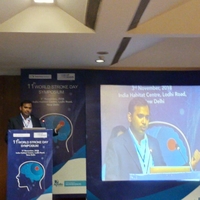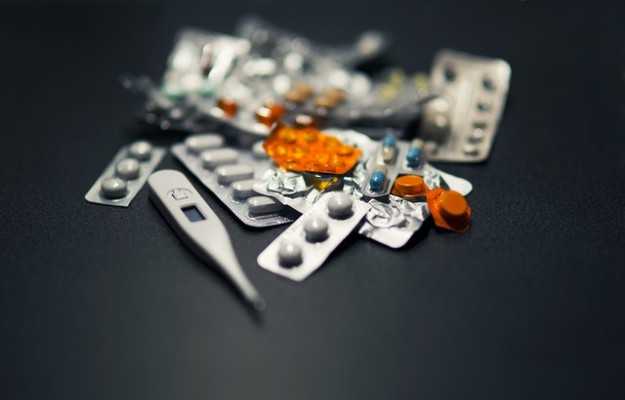Inflammation is the body’s natural (usually protective) response when it is faced with harmful stimuli (antigens) such as pathogens (like infectious bacteria), dead cells (due to an injury) or irritants or allergens (like pollen). At times, certain misinterpreted factors (autoantigens) of one’s own body can also cause inflammation.
Non-steroidal anti-inflammatory drugs (NSAIDs) target the inflammatory process and the intricate pathways involved in the development of inflammation. They are effective, cheap and useful medicines and are most frequently used to combat symptoms such as pain and fever.
While easily available, NSAIDs should be taken with caution as they are known to cause various side effects (sometimes fatal) and may cause interactions with other drugs that the patient might have been prescribed.
NSAIDs belong to a class of drugs known as non-opioid analgesics (painkillers). Examples of NSAIDs include several over-the-counter medicines like ibuprofen, diclofenac, aspirin.
- What is inflammation?
- What do NSAIDs do?
- Types of NSAIDs
- Indications for NSAIDs
- Side effects of NSAIDs
- Contraindications: when not to take NSAIDs
- NSAID drug interactions
- Who should not take NSAIDs
What is inflammation?
Noxious stimuli (antigens), like bacteria or allergens, react with special cells in the body known as antigen-presenting cells. This reaction usually triggers two kinds of immune responses: the innate immune response and the acquired immune response.
- Innate immunity, which is the body’s inherent nonspecific immune capability, initiates the production of chemicals called cytokines which act along with enzymes called cyclooxygenases (cyclooxygenase-1 and cyclooxygenase-2 or COX-1 and COX-2) to start the cycle of production of prostaglandins and leukotrienes that bring about inflammation in order to destroy the antigen. Enzymes are proteins that act as biological catalysts to speed up the rate of a chemical reaction inside the cells. Prostaglandins are physiologically active, lipid-based compounds that produce hormone-like effects in the human body. And leukotrienes act as secondary messengers in the events triggered by cytokines.
- Acquired immunity, mediated by white blood cells (WBCs), synthesizes antigen-specific antibodies to target the antigens. These antibodies persist in the blood and possess the ability to recognise and combat the same antigen if it attacks again.
Inflammation is a product of innate immunity, so it can be construed that it is a generic phenomenon. It can present with the following signs and symptoms, irrespective of the cause and may not always be associated with disease or infection. Sometimes, due to inborn errors of the immune system, antigens normally present in the body can cause inflammatory reactions. These are known as autoimmune diseases; for example, systemic lupus erythematosus (SLE) and rheumatoid arthritis (RA).
The five cardinal signs of inflammation are as follows:
- Calor: Heat or warmth in the inflamed area. The heat helps to kill any heat-sensitive pathogens.
- Dolor: Pain in the inflamed area. The pain encourages you to rest the area till it has healed.
- Rubor: Redness in the inflamed area.
- Tumour: Swelling in the inflamed area. In this case, the swelling is just another sign that the immune cells are doing their job.
- Functio laesa: Loss of function in the inflamed area. This factor also helps ensure you rest the area.
Types of inflammation: Inflammation is a complex biological and physiological phenomenon. While an inflammatory response that is too weak would not effectively tackle the invading antigen, an inflammatory response that is too strong causes a myriad of problems by damaging affected areas and eliciting the aforementioned signs and symptoms. Inflammation can be acute (short-term) or chronic (long-term). The major difference between these two kinds of inflammation is the shift in types of cell mediating the process. Also, chronic inflammation goes hand in hand with simultaneous tissue destruction and repair.
The causes of acute inflammation are as follows:
- Injury
- Infections
- Irritants (antigens like pollen)
The causes of chronic inflammation are as follows:
- Hypersensitivity (unwanted actions produced by the immune system) or allergy
- Autoimmune diseases: The body’s immune system, due to an error, sees the body’s own tissue as a target and attacks it. For example, rheumatoid arthritis (RA) and psoriasis are common autoimmune diseases.
- Incomplete resolution of acute inflammation
- Constant low grade exposure to the offending substance
What do NSAIDs do?
Normally, inflammation is a sign that our immune system is doing its job to kill pathogens and repair damaged tissue after an injury. However, sometimes the symptoms of inflammation like pain and swelling can become too much to handle. In these situations, many of us pop an ibuprofen or diclofenac (also the active ingredient in ointments like Volini) for relief. However, it’s important to understand how these medicines work in the body, their potential side effects and when not to take these medicines.
How NSAIDs work: Different non-steroidal anti-inflammatory drugs (NSAIDs) block different steps in the immune pathway, to stop the destructive properties of inflammation and provide symptomatic relief. Pain relief is the most important role. NSAIDs are routinely used for this purpose. NSAIDs work by blocking one or both cyclooxygenase enzymes, thereby preventing the production of prostaglandins. Prostaglandins bring about the symptoms of inflammation, most notably pain.
Actions and effects of NSAIDs by prostaglandin inhibition:
- Analgesia: Pain relief
- Antipyretic effect: Reduce fever
- Anti-inflammatory: Combats the five signs of inflammation
- Antithrombotic: Some NSAIDs can prevent the aggregation (coming together) of platelets to form blood clots by blocking the production of leukotrienes. This antithrombotic property is prominent in aspirin, which is also used to treat and prevent blood clotting diseases like heart attacks (myocardial infarction) and stroke.
- Closure of ductus arteriosus (a normal fetal blood vessel that connects the aorta and the pulmonary artery in newborn babies): Normally, the ductus arteriosus is supposed to close on its own shortly after birth. Sometimes, this does not take place on its own, leading to a patent ductus arteriosus. NSAIDs like indomethacin help in the closure of a patent ductus arteriosus in preterm babies (babies born before 37 weeks of pregnancy).
Types of NSAIDs
Depending on their action, NSAIDs are divided into the following types:
Non-selective NSAIDs: These are the most commonly used type of analgesic, or pain-relief medication, that is available over-the-counter at most pharmacies. These drugs inhibit both cyclooxygenase (COX-1 and COX-2) enzymes and thus inhibit the production of prostaglandins in all parts of the body non-selectively—including in the stomach lining, where prostaglandins created by cyclooxygenase-1 (COX-1) play a protective role. Therefore, excessive use of these drugs can cause bleeding in the stomach (haemorrhage) and even stomach ulcers.
Common non-selective NSAIDs include:
- Ibuprofen
- Aspirin
- Diclofenac
- Naproxen
- Mephenamic acid/ fenamate
- Indomethacin
Selective NSAIDs (Cyclooxygenase – 2 /COX-2 inhibitors): Some newer NSAIDs selectively only block the action of COX-2 enzyme that produces the pain-causing prostaglandins. It has no action on the protective prostaglandins of the stomach lining. While advantageous, these drugs are not very commonly prescribed due to other side effects. Celecoxib is the drug of choice in this class of medication.
The actions of selective NSAIDs are as follows:
- Analgesia
- Anti-inflammatory
Other analgesics with predominant antipyretic action: Paracetamol, also known as acetaminophen, is perhaps the most used over-the-counter drug in the country. It does not have any anti-inflammatory action, but it is a useful analgesic (relieves pain) and antipyretic (subsides fever).
Actions of acetaminophen:
- Analgesia
- Antipyretic
Indications for NSAIDs
NSAIDs may be prescribed to people experiencing the following:
- Acute and chronic pain
- Headache
- Migraine
- Dysmenorrhoea (menstrual period pain)
- Post-operative pain
- Inflammatory arthritis
- Rheumatoid arthritis
- Kawasaki disease
- Fever (antipyretic): An NSAID may be given for symptomatic management, irrespective of the cause of fever.
- Closure of ductus arteriosus in infants who are born preterm: Indomethacin is the drug of choice.
- Blood-thinning after myocardial infarction (heart attack) or stroke: Low-dose aspirin has anti-platelet action and helps prevent the formation of further blood clots.
- Colon cancer prevention: In cases of colon polyps that run in the family (familial colonic polyposis), aspirin is initiated at an early age to prevent colon cancer.
Side effects of NSAIDs
The side effects of different types of NSAIDs are as follows.
Non-selective NSAIDs:
- Stomach ulcer, intestinal ulcer, bleeding or perforation
- Kidney function impairment: Acute kidney injury, worsening of pre-existing chronic kidney disease, or analgesic nephropathy (kidney disease due to prolonged use of NSAIDs)
- Increased risk of thrombosis: Heart attack or stroke (except with aspirin and naproxen)
- Can precipitate asthma attack in asthmatic patients
- Reye’s syndrome (in children suffering from chickenpox infection who are treated with aspirin)
- Haemolytic anaemia (destruction of red blood cells) can occur with aspirin use in individuals with enzyme G6PD deficiency. G6PD is glucose-6-phosphate dehydrogenase.
Selective NSAIDs:
- Increased risk of thrombosis: Heart attack or stroke
- Kidney function impairment: Worsening of pre-existing condition and elevation of blood pressure
- Drug interactions with sulpha drugs: Certain diabetes medicines like glimepiride and antibiotics like trimethoprim
Paracetamol (Acetaminophen):
- Hepatotoxicity (damage to the liver, including acute liver failure with overdose intoxication)
Contraindications: when not to take NSAIDs
While NSAIDs can provide immediate symptomatic relief and are easily available, it is not always prudent to use them. Certain conditions can get aggravated by their use. NSAIDs should be avoided, or taken only after consultation with a physician, by individuals with:
- Peptic ulcer in the stomach or intestines: Non-selective NSAIDs should be avoided but selective COX-2 inhibitor might be advised by doctors.
- Acute bleeding (especially aspirin, which prevents clotting that is important to stop the bleeding)
- Kidney disease: The urine output of the kidneys can reduce severely, leading to kidney failure or chronic kidney disease.
- Congestive heart failure
- Last two trimesters of pregnancy: It can cause premature closure of the ductus arteriosus in the baby’s heart.
NSAID drug interactions
NSAIDs interact with many drugs and can either reduce their efficacy or cause other complications. Notable drug interactions of NSAIDs are as follows:
- Antihypertensive drugs: Some high blood pressure medicines, like Furosemide (diuretic) and Captopril (ACE inhibitor), work by acting on kidney prostaglandins. They could lose their efficacy when taken along with NSAIDs and the blood pressure could rise.
- Antithrombotic drugs: Some drugs that stop platelet aggregation and blood clotting or blood-thinning drugs like warfarin and even aspirin bind with the same factor as NSAIDs to exert their action. Therefore, if taken with NSAIDs, they get displaced and lose their activity. Without their protective action, new blood clots may form.
- Antidepressants: Selective serotonin reuptake inhibitors (SSRIs) are medicines used to treat depression. They themselves increase bleeding tendency. In conjunction with NSAIDs, the risk for blood loss or stomach ulcers increases manifold.
- Lithium: Lithium is used to treat mania and bipolar disorder. NSAIDs, by blocking kidney prostaglandins synthesis, could cause the retention of lithium. This can lead to tremors, speech difficulties and muscle problems.
- Sulpha drugs: Sulpha drugs include medicines like glimepiride and glibenclamide (sulphonylureas), used to treat diabetes mellitus. NSAIDs induce hypoglycaemia (low blood sugar) in patients taking sulphonylureas by altering ion concentrations and influencing insulin secretion.
- Alcohol: When taken along with NSAIDs, alcohol increases the risk of stomach bleeding.
Who should not take NSAIDs
NSAIDs should be avoided, taken with caution, or replaced in:
- Asthmatics: Asthma attack can be precipitated by NSAIDs
- Diabetics: Hypoglycaemia (low blood sugar levels) may occur in people with diabetes
- People with high blood pressure: Blood pressure may remain uncontrolled and elevated
- Pregnant women: Women in the second and third trimester should not take NSAIDs as they could lead to heart anomalies in the baby
- Individuals scheduled for surgery: NSAIDs, especially aspirin, should be stopped at least a week prior to surgery to prevent the risk of excessive bleeding
- G6PD deficiency (Glucose - 6 phosphate - dehydrogenase deficiency) patients: Haemolytic anaemia can occur
(Read more: G6PD Test)
Find Allergist and Immunologist in cities
Doctors for NSAIDs: Non-steroidal anti-inflammatory drugs

Dr. Abhas Kumar
Allergy and Immunology
10 Years of Experience

Dr. Hemant C Patel
Allergy and Immunology
32 Years of Experience

Dr. Lalit Pandey
Allergy and Immunology
7 Years of Experience

Dr. Shweta Jindal
Allergy and Immunology
14 Years of Experience
References
- Weiss U. Inflammation. Nature. 2008 Jul 24;454(7203):427. PMID: 18650912.
- Day R., Graham G. NSAIDs and their Indications.. Nature 454, 427 (2008).
- Garcia-Albeniz X, Chan AT. Aspirin for the prevention of colorectal cancer. Best Pract Res Clin Gastroenterol. 2011 Aug;25(4-5):461-72. PMID: 22122763.
- National Health Service [Internet]. UK; Reye's syndrome
- Moore N, Pollack C, Butkerait P. Adverse drug reactions and drug–drug interactions with over-the-counter NSAIDs. Ther Clin Risk Manag. 2015; 11: 1061–1075. PMID: 26203254.
- Li J, et al. Non-steroidal anti- inflammatory drugs increase insulin release from beta cells by inhibiting ATP-sensitive potassium channels.. Br J Pharmacol. 2007 Jun;151(4):483-93. PMID: 17435793.














